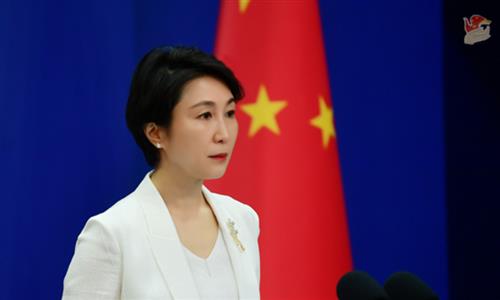
Photo: VCG
China on Wednesday has launched a pilot program to expand the opening-up of value-added telecommunications services, marking a steadfast step of the world's second-largest economy to continue expanding high-level opening-up despite external pressures and rising protectionism in the world.
The latest move, adding to a flurry of concrete opening-up measures in manufacturing and healthcare industries in recent months, shows the Chinese government's unwavering commitment to continuing opening-up and sharing its development opportunities with enterprises from all countries, analysts said.
The pilot program to expand the opening-up of value-added telecommunications services has been kick started in four areas, including Beijing's national comprehensive demonstration zone for expanding opening-up in the service sector, Lingang new area of the China (Shanghai) Pilot Free Trade Zone and the pioneer area for socialist modernization in Shanghai, Hainan Free Trade Port and Shenzhen pilot demonstration area of socialism with Chinese characteristics, the Global Times learned from China's Ministry of Industry and Information Technology (MIIT) on Wednesday.
The pilot program will allow foreign investors to operate wholly-owned businesses such as internet data centers and engage in online data processing and transaction processing in the designated areas. They can also gain greater access to China's cloud computing service and computing power service markets, Xinhua reported.
"Expanding the opening-up of telecom industry is an important measure to steadily push for institutional opening-up, integrate into global division of labor and cooperation, and enhance China's competitive advantage and leading position in the telecommunications industry," Minister of Industry and Information Technology Jin Zhuanglong said at a press briefing of MIIT on Wednesday.
As of September, the number of foreign enterprises approved to operate telecommunications services has increased to 2,220, according to media reports.
Zhang Hongtao, deputy director of Shanghai Municipal Commission of Economy and Informatization, disclosed that 10 foreign enterprises have filed application to join the pilot program in Shanghai, including Tesla, Trafigura, HSBC Fintech, and a subsidiary of Siemens, among others.
"China's telecom industry stands at the world's leading level, and the launch of a pilot program in this regard further demonstrated China's firm resolution to open its door wider and offer foreign firms with broader development opportunities," Xiang Ligang, director-general of the Beijing-based Information Consumption Alliance, told the Global Times on Thursday.
According to telecom industry insiders, telecommunication is a fundamental pillar industry closely linked to national security. So China's open attitude in the field also offers a sharp comparison to some Western countries' geopolitical moves to sideline Chinese telecom equipment-makers from their core networks.
China offers opportunity
"Those are concrete steps and are carried out in a gradual manner in accordance with China's development status. They also deliver a key message, that China welcomes foreign enterprises that are willing to comply with Chinese laws and relevant policies, to jointly write a new chapter of win-win cooperation," Xiang said.
China's extension of an olive branch has drawn in more foreign companies to up their antes in the Chinese market either in recent months, or in the foreseeable future.
The seventh China International Import Expo (CIIE), a pivotal platform for China's high-level opening-up that will take place in Shanghai in November, has attracted a total of 3,496 exhibitors from 129 countries and regions, exceeding the previous session, officials told a press conference Wednesday. The number of Fortune Global 500 companies and industry leaders among the exhibitors reached 297, setting a new historical high, according to official information.
Calvin McDonald, CEO of lululemon, a Canadian fashion brand that has registered for CIIE, told the Global Times that the company "remains steadfast in our commitment to further invest and grow our presence in the market." China continues to be a key growth engine for lululemon's international business, and the company expects it to be the brand's second-largest market globally by fiscal year 2026, he noted.
"Such thriving enthusiasm on the Chinese market is a manifestation of how foreign enterprises are 'voting with their feet.' As Chinese officials have said, China is the next opportunity. No one could afford losing one of the world's most-promising markets, with sheer size and huge untapped potential," Xiang said.




